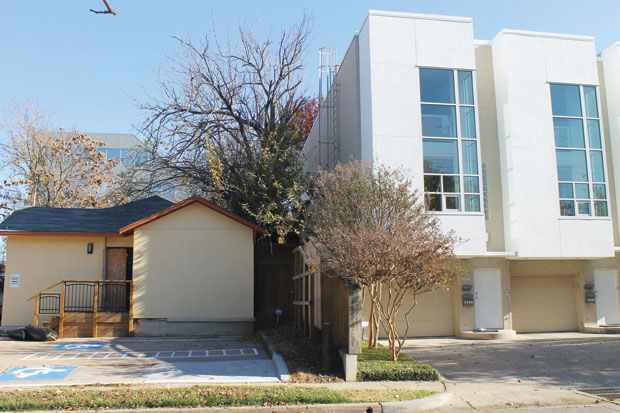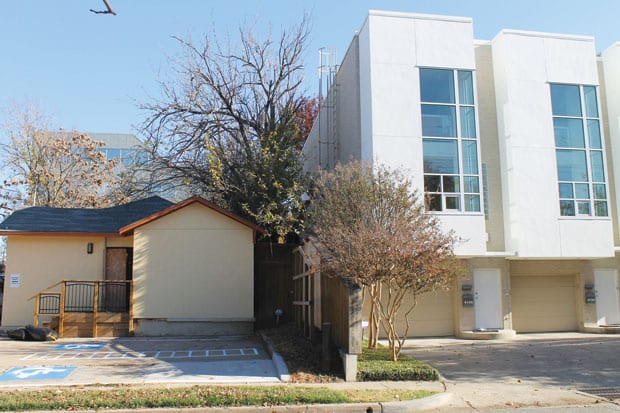Proposed decision says reopening iconic gay bar on Buena Vista ‘not consistent with the general welfare and peace of the local community’

CLOSE QUARTERS | Administrative Law Judge Craig Bennett noted that the Hideaway, left, is fewer than 10 feet from the closest townhome, right. (David Taffet/Dallas Voice)
An administrative law judge is recommending that the Texas Alcoholic Beverage Commission deny a license for Marty’s Hideaway, making it unlikely that the gay bar on Buena Vista will open anytime soon.
The Hershner family, which also owns the Tin Room and Chesterfield’s, has been trying to reopen the iconic piano bar that closed more than three years ago in the Cole Park area of Oak Lawn.
But a group of neighbors challenged the Hershner’s application for a TABC license, citing noise, crime, trash and other concerns.
The neighbors’ protest was heard at a daylong hearing before an administrative law judge in January.
“Applicant cannot rely on the prior bar’s existence to bootstrap its application; rather the area is evaluated as it is at the time relevant to the application,”
Administrative Law Judge Craig Bennett wrote in his Proposal for Decision, dated Feb. 21.
However, the judge also dismissed many of the arguments of the neighbors protesting the application. Their case was based on five points — the manner in which the Tin Room operates, tax problems of principal owner Paulette Hershner, increased crime in the area, increased traffic and noise in the neighborhood, and not meeting building codes.
Noting only one violation among three bars they own over a number of years, the judge called the Hershners’ record “relatively good.” A payment plan is in place for the tax debt and “other entities” control building codes.
“The ALJ does not find that the manner in which Applicant has conducted its business is a valid basis for denying the permits in this case,” Bennett wrote.
While denying the neighborhood concerns about the Hershners, he is concerned about the place where the bar is located.
“Noise, crime and other nuisance problems have diminished since Bill’s Hideaway closed,” he wrote, noting the bar is fewer than 10 feet from the closest townhouse.
“A bar that is open until 2 a.m. with an open air patio and music is not consistent with the general welfare and peace of the local community,” he wrote. “Rather, such would be expected to be disruptive to local residents and be a nuisance to them.”
The Hershners argued that new residential development that takes places after a bar is in place shouldn’t be justification for closing the bar. But the judge sees this as a new facility, since Bill’s Hideaway closed more than three years ago.
But Bennett’s decision is not the end of the road for the Hideaway.
“I know of cases where the district court overturned the administrative court and where TABC disagreed,” TABC spokeswoman Carolyn Beck said.
She said the losing side can file exceptions and the winning side can file responses. If the judge changes his proposal, the neighborhood may file a request for a new hearing. If the proposal stands, the Hershners may request a new hearing. They have 30 days to ask for a rehearing.
Beck said it’s unusual for a new hearing to be granted. Substantial new evidence would have to be presented for the case to be heard again.
If the ruling changes in favor of the Hershners, the neighborhood has no more opportunities to appeal. But if the ruling stands in favor of the neighbors, the
Hershners may appeal to district court.
TABC may also ignore the proposal and issue the license anyway.
“We have the authority to do that, but don’t do that very often,” Beck said.
Tim Griffith, attorney for the Hershners, said his clients are still deciding what to do. “I’ve never seen one so hotly contested,” he said.
Van Shaw, attorney for the neighbors, said: “I think justice was done. That’s just not a proper location for a bar.”
This article appeared in the Dallas Voice print edition March 8, 2013,

